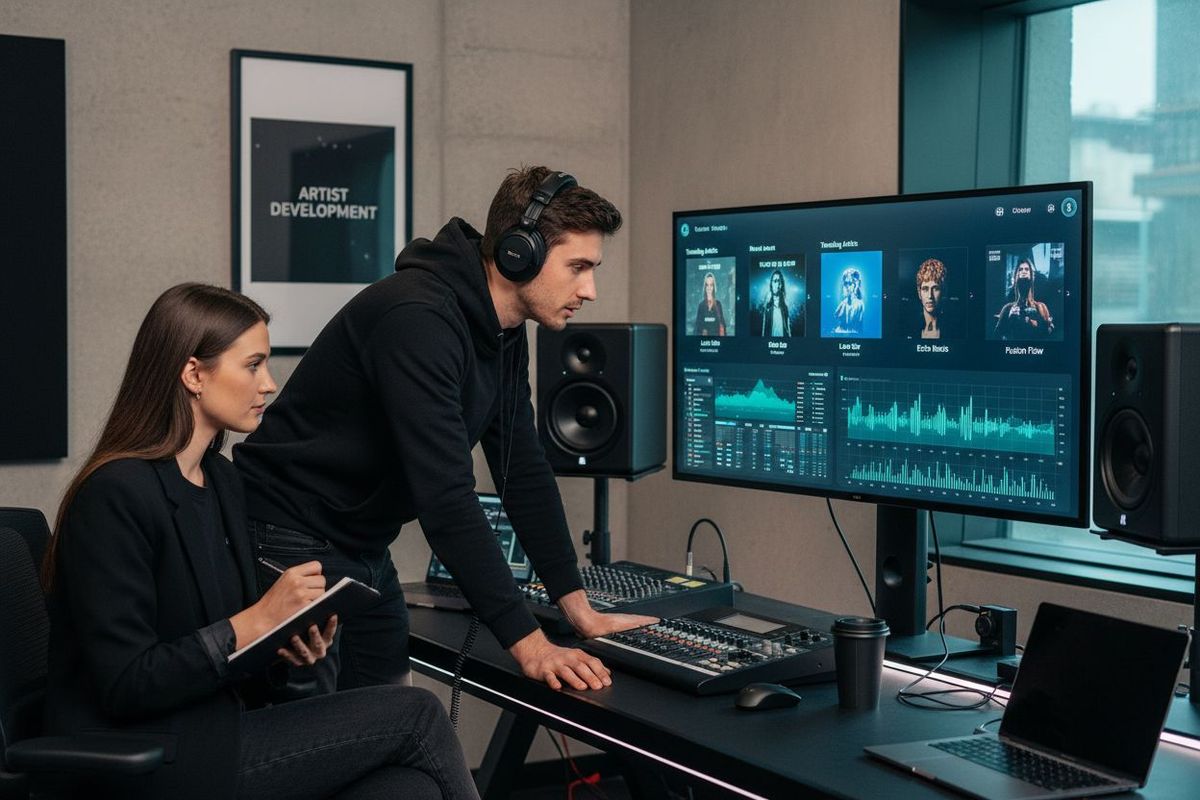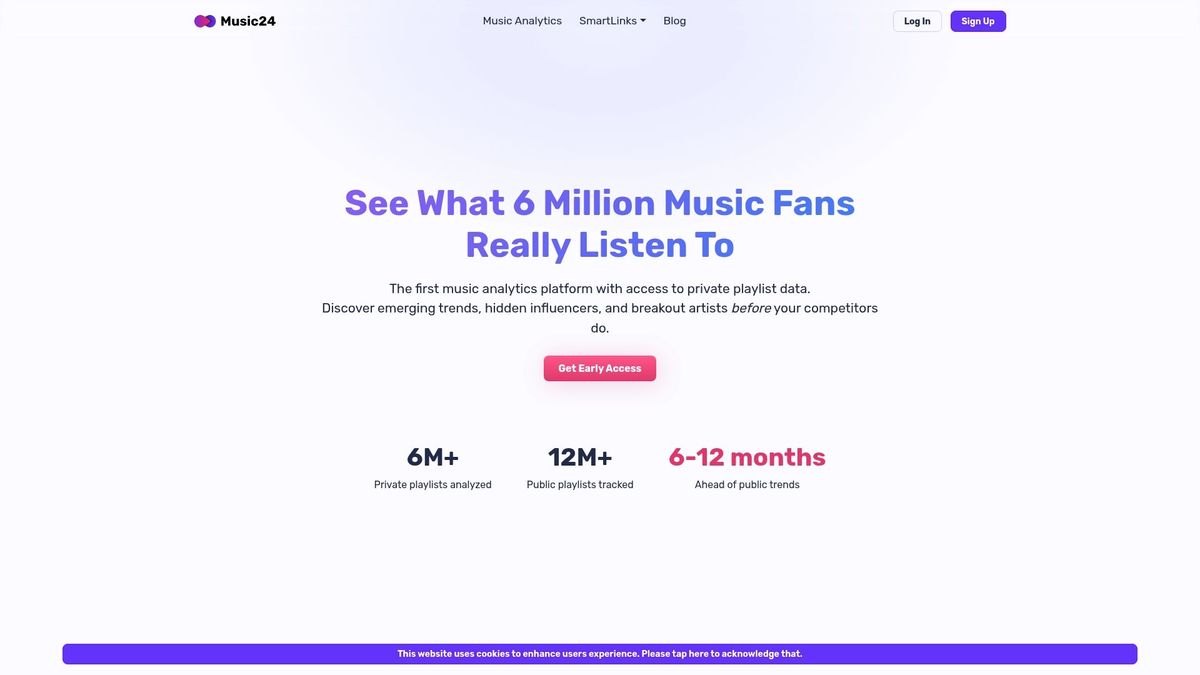Music discovery platforms are quietly reshaping how people stumble upon new artists and genres every day. The surprising part is these platforms use machine learning that does not just match genres, but predicts moods and daily habits to recommend hidden gems. Most realize they are listening to smarter playlists, but few know these systems are actually mapping personal musical journeys with every swipe and skip.
Table of Contents
- Defining Music Discovery Platforms: What They Are
- The Importance of Music Discovery Platforms in the Industry
- How Music Discovery Platforms Operate: Key Features
- Understanding User Engagement and Algorithms in Music Discovery
- The Future of Music Discovery Platforms: Trends and Innovations
Quick Summary
| Takeaway | Explanation |
|---|---|
| Music discovery platforms enhance user engagement. | These platforms turn passive listening into active exploration, encouraging listeners to discover new music tailored to their tastes. |
| Algorithmic recommendations drive personalized experiences. | Utilizing advanced machine learning, these systems adapt recommendations based on a user's evolving preferences and behaviors. |
| Industry professionals leverage data for talent identification. | Analytics from these platforms help identify emerging artists and monitor listener engagement trends more accurately than traditional methods. |
| Emerging AI technologies will personalize music discovery further. | Future advancements will include contextual intelligence that considers emotional and environmental factors, enhancing user experience. |
| Ethical considerations will shape future platform development. | Greater transparency and user control over recommendation algorithms will empower users and foster trust in music discovery processes. |
Defining Music Discovery Platforms: What They Are
Music discovery platforms represent sophisticated digital ecosystems designed to help listeners explore, encounter, and engage with new musical content beyond traditional listening experiences. According to research in digital music interactions, these platforms leverage advanced technological mechanisms to transform how individuals find and interact with music.
The Core Purpose of Music Discovery
At their fundamental level, music discovery platforms serve as intelligent navigation systems for the vast musical universe. Their primary objective is to break users out of familiar listening patterns and introduce them to artists, genres, and soundscapes they might never encounter through conventional radio or personal playlists. These platforms accomplish this through multiple strategic approaches:
- Algorithmic recommendation engines that analyze listening history
- Curated playlists created by music experts
- Social listening features that showcase what peers are enjoying
- Advanced metadata analysis to identify musical similarities
Technological Mechanisms Behind Discovery
The technological infrastructure of music discovery platforms is remarkably complex. They utilize machine learning algorithms that continuously analyze user behavior, musical preferences, and emerging trends to generate personalized recommendations. These systems do not merely suggest music based on genre or existing favorites but create intricate musical maps that connect listeners with unexpected and compelling sonic experiences.
For professionals in the music industry, these platforms represent more than entertainment tools. Researchers have demonstrated that music discovery platforms are critical for understanding emerging listener trends, identifying potential breakout artists, and mapping evolving musical landscapes. You can read more about detecting music trends early to understand how these platforms provide strategic insights.
The sophisticated nature of these platforms transforms music consumption from a passive to an active, exploratory experience, empowering listeners to continuously expand their musical horizons.
The Importance of Music Discovery Platforms in the Industry
Music discovery platforms have become critical strategic tools that transform how the music industry identifies, develops, and promotes musical talent. Research from digital music ecosystem studies demonstrates their profound impact on artist development and listener engagement strategies.
Revolutionizing Artist Talent Identification
Traditionally, talent scouting relied heavily on personal networks, live performances, and word-of-mouth recommendations. Music discovery platforms have fundamentally disrupted this model by providing data-driven insights that enable music professionals to detect emerging artists with unprecedented precision.
 These platforms offer comprehensive analytics that go beyond surface-level metrics, revealing nuanced listener behaviors and genre-crossing trends.
These platforms offer comprehensive analytics that go beyond surface-level metrics, revealing nuanced listener behaviors and genre-crossing trends.

Key advantages for talent identification include:
- Real-time tracking of listener engagement metrics
- Granular analysis of audience demographic preferences
- Early detection of viral music trends
- Identification of cross-genre audience crossover potential
Strategic Marketing and Audience Development
For music industry professionals, these platforms represent more than technological tools they are strategic intelligence systems. Sophisticated recommendation algorithms enable targeted marketing approaches that connect artists with precisely matched audience segments. By understanding listener preferences at molecular levels, record labels and artist managers can craft highly personalized promotional strategies.
Our comprehensive guide to music data interpretation provides deeper insights into leveraging these advanced analytics for strategic decision making.
Economic and Creative Ecosystem Impact
Music discovery platforms are not just technological innovations they are economic catalysts that democratize music exposure. By reducing barriers to entry for emerging artists, these platforms create more equitable pathways for musical talent to reach global audiences. Industry research indicates that platforms enabling direct artist-listener connections are fundamentally reshaping music consumption and production paradigms.
These platforms ultimately serve a dual purpose: empowering listeners to expand their musical horizons while providing music industry professionals with unprecedented insights into audience behavior and emerging talent trends.
To clarify the differences between traditional methods and modern music discovery platforms in artist identification and development, the following table summarizes key distinctions based on the article's content.
| Aspect | Traditional Talent Identification | Music Discovery Platforms |
|---|---|---|
| Approach | Relies on personal networks and live shows | Uses real-time analytics and user data |
| Data Sources | Word-of-mouth, in-person observations | Listener engagement metrics, demographics |
| Speed of Trend Detection | Slower, often reactive | Early detection of viral trends |
| Audience Reach | Limited, locally focused | Global, scalable exposure |
| Artist Discovery Precision | Based on individual judgments | Data-driven, algorithmically-enhanced |
| Cross-Genre Insights | Rarely identified | Readily identifies audience crossover |
| Impact on Emerging Artists | High barrier to entry | Lowers entry barriers, democratizes reach |
How Music Discovery Platforms Operate: Key Features
Music discovery platforms employ sophisticated technological frameworks that transform raw musical data into personalized, intelligent listening experiences. Research in digital recommendation systems reveals the intricate mechanisms that power these innovative platforms.
Algorithmic Recommendation Architecture
At the core of music discovery platforms lies a complex machine learning infrastructure designed to analyze and predict musical preferences. These systems utilize multiple data points to generate recommendations, moving far beyond simplistic genre matching. The recommendation engines continuously learn from user interactions, creating dynamic musical profiles that evolve with changing listener tastes.
Key technological components include:
- Neural network-based pattern recognition
- Collaborative filtering algorithms
- User behavior tracking mechanisms
- Contextual music metadata analysis
Data Processing and User Profiling
Music discovery platforms aggregate vast amounts of listening data to construct nuanced user profiles. They track granular details such as time of day, mood indicators, skip rates, and cross-genre listening behaviors. Advanced machine learning models transform these seemingly disparate data points into cohesive musical recommendations that feel remarkably intuitive.
Our comprehensive guide to music data interpretation provides deeper insights into how these complex systems operate.
Personalization and Adaptive Learning
The most sophisticated music discovery platforms distinguish themselves through continuous adaptive learning. Unlike static recommendation systems, these platforms dynamically adjust their suggestions based on real-time user interactions. Industry research demonstrates that platforms capable of rapid algorithmic adaptation provide significantly more engaging user experiences.
These platforms essentially create a personalized musical ecosystem that feels simultaneously familiar and exploratory, bridging the gap between known preferences and undiscovered musical territories.
To help readers visualize the main technological features and functions of music discovery platforms, this table summarizes their core components and roles as discussed in the article.
| Feature/Component | Description | Role in Music Discovery |
|---|---|---|
| Algorithmic Recommendation Engines | Leverage machine learning to analyze user data and music patterns | Produce tailored music suggestions |
| Curated Playlists | Created by music experts using thematic or genre-based criteria | Guide users to new music paths |
| User Behavior Tracking | Records listening habits, skips, time of day, moods | Refines personalization accuracy |
| Metadata Analysis | Examines song attributes (tempo, mood, genre, etc.) | Finds hidden similarities/links |
| Adaptive Learning Algorithms | Continuously update recommendations based on real-time feedback | Keeps experience fresh and relevant |
| Social Listening Features | Showcases what peers are listening to | Enables discovery through networks |
Understanding User Engagement and Algorithms in Music Discovery
User engagement represents the complex neural network through which music discovery platforms transform passive listening into dynamic, personalized musical experiences. Research in algorithmic music curation reveals the intricate mechanisms that drive user interaction and satisfaction.
Behavioral Tracking and Predictive Modeling
Music discovery platforms utilize sophisticated behavioral tracking systems that capture granular details of user interactions. These systems go beyond simple play counts, analyzing nuanced signals such as listening duration, skip rates, time of day, contextual mood, and cross-genre exploration. The algorithms create multidimensional user profiles that continuously evolve with each interaction.
Key engagement metrics include:
- Frequency of playlist additions
- Song completion rates
- Cross-genre listening patterns
- Time spent exploring new artists
- Emotional resonance indicators
Algorithmic Adaptation and Learning
The most advanced music discovery platforms employ machine learning models that transform raw interaction data into predictive recommendations. These algorithms do not simply repeat past preferences but anticipate potential musical interests by understanding complex listener psychology. By analyzing subtle connections between seemingly unrelated musical elements, platforms can introduce listeners to unexpected yet compelling musical discoveries.
Learn how to leverage private playlist data for deeper insights and understand the nuanced world of music recommendation strategies.
Psychological Dimensions of Musical Recommendation
Interdisciplinary research demonstrates that effective music discovery is more than a technological challenge it is a profound psychological interaction. Successful platforms create a delicate balance between familiarity and novelty, using algorithms that feel simultaneously intuitive and exploratory.
These platforms essentially function as musical curators, understanding that each listener's journey is unique, and crafting personalized sonic experiences that adapt and evolve in real time.
The Future of Music Discovery Platforms: Trends and Innovations
The landscape of music discovery platforms is rapidly evolving, driven by technological advancements and changing listener behaviors. Research in emerging digital music technologies highlights the transformative potential of next-generation recommendation systems.
Artificial Intelligence and Contextual Intelligence
Advanced artificial intelligence is set to revolutionize music discovery by developing hyper-personalized recommendation engines. Future platforms will move beyond traditional algorithmic approaches, incorporating contextual intelligence that understands not just musical preferences, but the emotional and environmental factors influencing listener experiences. These systems will analyze complex data points such as physiological responses, real-time mood indicators, and comprehensive lifestyle patterns.
Emerging technological capabilities include:
- Emotion-based recommendation algorithms
- Biometric listening preference tracking
- Neurological response mapping
- Contextual environmental music selection
- Predictive listening experience generation
Immersive and Interactive Discovery Experiences
The next generation of music discovery platforms will transcend traditional audio streaming, creating immersive multisensory experiences. Platforms will integrate augmented reality, virtual concert experiences, and interactive musical narratives that transform passive listening into dynamic, participatory journeys. Machine learning will enable platforms to craft uniquely personalized musical worlds that adapt in real-time to individual user interactions.
Our comprehensive guide to music data interpretation provides deeper insights into the technological innovations shaping music discovery.
Ethical AI and User Empowerment
Interdisciplinary research emphasizes the growing importance of ethical considerations in algorithmic music recommendation. Future platforms will prioritize user agency, offering transparent algorithmic processes and granular control over recommendation mechanisms. This approach will balance technological sophistication with individual user preferences, creating a more collaborative and respectful music discovery ecosystem.
The future of music discovery platforms represents a profound convergence of technology, psychology, and artistic expression, promising increasingly personalized and meaningful musical experiences.
Take the Uncertainty Out of Music Discovery—Unlock Real Trends Now
Are you struggling to identify genuine emerging artists and music trends before they hit the mainstream? As the article explains, music discovery platforms often rely on public data, making it tough for industry professionals to break out of the echo chamber and spot talent early. With millions of playlists and shifting listener behaviors, staying ahead is more challenging than ever. Traditional public metrics often fall short when you need to predict what’s next or understand true audience engagement.

Why wait for public charts to catch up? Music24.com delivers unprecedented insights by analyzing millions of private playlists, revealing hidden curators, cross-genre micro-trends, and nurturing tomorrow’s breakout stars—well before they appear anywhere else. See how our predictive analytics can help you go beyond surface-level data and make smarter, faster decisions. Explore the future of early discovery by visiting Music24.com or dive deeper into our approach to leveraging private playlist data. Now is the time to access the edge only true private data can offer.
Frequently Asked Questions
What is a music discovery platform?
Music discovery platforms are digital ecosystems that help listeners explore and engage with new music through advanced technological mechanisms. They introduce users to artists and genres beyond their usual preferences.
How do music discovery platforms recommend new music?
These platforms use algorithmic recommendation engines that analyze user behavior, curate playlists, and utilize social listening features to suggest music based on listening history and emerging trends.
What technologies do music discovery platforms use?
They utilize sophisticated machine learning algorithms, user behavior tracking, and advanced metadata analysis to create personalized listening experiences and recommend music that aligns with individual preferences.
How do music discovery platforms benefit artists and the music industry?
Music discovery platforms provide critical data-driven insights for identifying emerging artists, tracking listener engagement, and shaping targeted marketing strategies, ultimately transforming how music is promoted and consumed.


